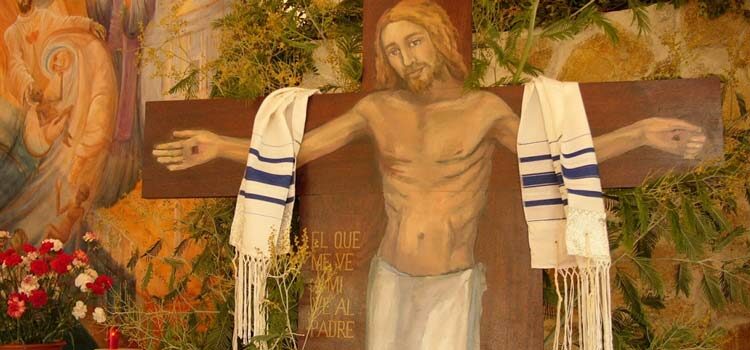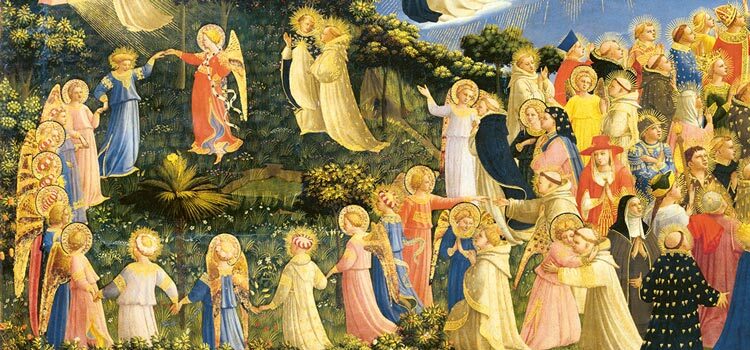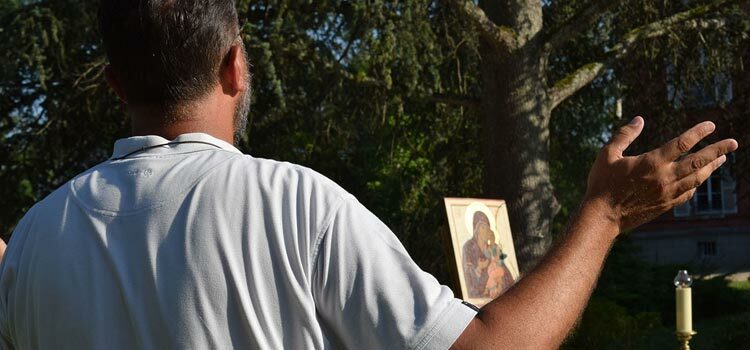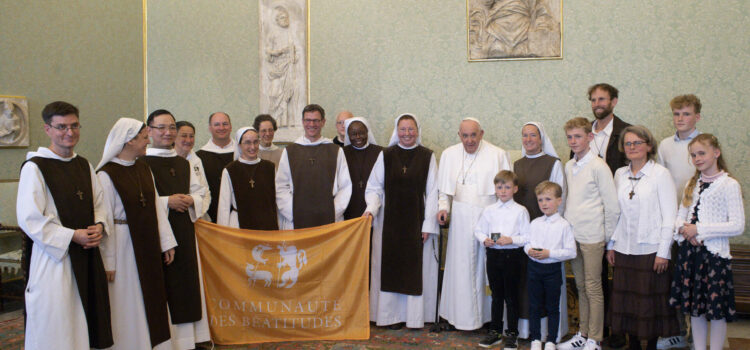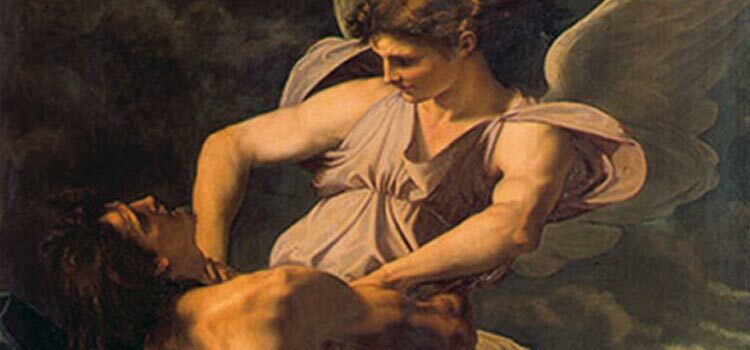The sign of the cross introduces us into Christian life (first rite of Baptism), it opens each of our liturgical prayers (and probably our own). But what connection is there between the Cross and our prayer life?
Experiencing the Cross
“There is no other path to Christian prayer but Christ […]” (CEC n° 2664).
Our prayer reaches the Father through Christ’s prayer : « Through Him, with Him and in Him, to you God the Father […] » The pre-eminent prayer of Christ is the offering of his life on the Cross :
« Jesus’s prayer involves a loving adhesion to the will of the Father as far as the Cross and an absolute trust that He will be heard » (CEC n° 2620). Through the Cross of Christ, our prayer is not that of the slaves but of sons before their Father. Through the Cross of Christ, the Father welcomes our prayers as the father of the parable welcomes the prodigal son, kissing him.
Sometimes we might think : since we are redeemed, since we are sons, our prayer should not be turned towards the Cross but towards the Resurrection ! An illusion …because the Cross and the Resurrection are inseparable. In every Eucharist we celebrate Christ’s Passion and Resurrection. Our prayer must take up the Cross as well and follow Christ’s prayer who is the Way, in order to reach the Heart of the Father (cf. Mt. 16,24). It is this share in Christ’s Cross that gives some fecundity to our prayer life. Some active share, as, for instance when we fast or when we stay up during the night in order to support our prayer ; or some passive share when the Cross comes and touches our lifes.
The Cross fecundates our prayer
Our prayer goes up to the Father by the « elevator » of the Cross, but even more so, our prayer finds all its fecundity when we pray « in » Christ’s Cross. When the Cross « embraces » our flesh or our soul, Christ comes and prays in us and fecunds our prayer.
Prayer of request. The good thief unites his passion to Christ’s and his apparently crazy request, on the threshold of death is granted straight away : « Truly I say to you, today you will be with me in Paradise ». The other thief lives his passion in revolt, turned towards himself and dies alone in his suffering (cf. Luke. 23, 39-43).
Prayer of intercession. Saint Silouane tells us : « When man prays, he gives the blood of his heart ». Does he say that while contemplating the open Heart of Christ on the Cross ? As soon as St Thérèse of the Child Jesus offers herself as a victim to merciful Love (June 1895) her body and soul are united to the Passion of Christ (April 1896). Sitting at the table of sinners, she offers herself for them with Christ and she can spend her Heaven doing good on earth, interceding with the Father for us.
Prayer of praise. For instance, the praise of the three young men in the furnace (cf.Dn.3,23-25) or the beatitude of the persecuted for righteousness’sake who rejoice and are glad (Mt.5,10-12). It is after he received the stigmata bearing in his flesh the Passion of Christ and nearly blind, that St Franciscus writes the Canticle of Creatures : « Praised are thou My Lord… ».
Prayer of adoration. When the Cross « touches » our adoration, it is the moment when the vessel breaks so the perfume is poured out and fills the whole house ( cf. Mc 14,3 ; Jn 12,3, Ps. 50,19). At the foot of the Cross, St John is in pain and incomprehension of the mystery of the Passion, but he stands in adoration and contemplates the Heart of Christ forever opened for us to dwell in. And Mary’s heart is opened by the sword, so that everything this heart has kept, pondered over and adored of the mystery of Christ, be surrendered to those who stand with her at the foot of the Cross. When Saint Teresa of Calcutta hears the words « I thirst ! » from Christ in the « I thirst !» coming from the poor, the Cross invades her soul and her adoration tirelessly goes from Christ on the Cross in the Blessed Sacrement to Christ on the Cross in the poor. For her, in a very particular way, « The Cross is the place where praying and giving onself are one » (CEC n° 2605). Taking care of the dying, she is a new Mary « pouring this perfume on my body in view of my burial » (cf. Mt.26,12). In going to the poor of Calcutta, she lived what the holy Curate of Ars had said : « The Cross is bearing you, it is not you who bear it » The Cross of Christ carried her towards the poor.
Welcoming the cross
When Christ’s Cross comes and « touches » us, do we welcome it in humble and trusting adoration or do we harden our heart to protect ourself ? If we welcome it, we can begin to understand the words of Saint Louis-Marie Grignon de Montfort : « No Cross, what a Cross ! » or those of Lanza del Vasto in the prayer around the fire « Love is the joy of suffering ». We welcome fecundity – painful as giving birth may be – brought by the Cross to our prayer, to our adoration. If we add up our small everyday crosses or the heavy trials of our life, with the Cross of Christ, then « it is not I who pray but Christ who prays in me » paraphrasing St Paul in Ga 2, 19-20. Then my prayer is kept in the Heart of Christ, ever open in the Celestial Jerusalem since the Ascension and my adoration shares the eternal adoration which moves within the bosom of the Holy Trinity. But I do not know it then because the Cross of Christ sets me in the night : « My God, my God why have you forsaken me ? » (Mat.27,46) And like Christ in Gethsemani, like Théreèse of Lisieux or Mother Teresa, I have nothing left but faith to walk with in loving surrender to the will of the Father : « Not as I will but as you will » (Mat.26,39).
As for knowing whether our barrenness is a sign of our participation in Christ’s Cross or linked with our tiredness or lazyness or our lack of zeal, the fruits will allow us to estimate that : Our participation in the Cross breathes in us fruits of humility, meekness, goodness, peace and deep joy in the very heart of our outer storms.
Lastly, let us not forget that, every time the Church calls for God’s blessing upon our world, its prayer is accompanied with the Sign of the Cross : In the Name of the Father, of the Son and of the Holy Spirit ». Through the Cross, our prayer meets the blessing of God ».
Job’s testimony Job’s testimony (cf. Jb 42,13(cf. Jb 42,13–15)15)
Job’s testimony shows us how the Cross transforms our praye
Job’s testimony shows us how the Cross transforms our prayer. Before the r. Before the trial, God’s blessing had given Job seven sons and three daughters whose trial, God’s blessing had given Job seven sons and three daughters whose name we do not know. After the trial, the Lord gives him again seven sons name we do not know. After the trial, the Lord gives him again seven sons whose name we do not know and three daughters whose name we are told, but whose name we do not know and three daughters whose name we are told, but also that they were valso that they were very beautiful and received from their father a share of ery beautiful and received from their father a share of inheritance with their brothers. Why this sudden care for his daughtersinheritance with their brothers. Why this sudden care for his daughters ? ? Through the trial, Through the trial, — the Cross the Cross –– his prayer of thanksgiving, when receiving his prayer of thanksgiving, when receiving God’sGod’s blessing is less turned to efficblessing is less turned to efficiencyiency –– whiwhich is culturally symbolisedch is culturally symbolised moremore by manhood by manhood –– but to fecundity but to fecundity –– symbolisedsymbolised moremore by feminity by feminity –– less less towards «towards « to doto do » more towards «» more towards « to beto be », less towards to act than towards », less towards to act than towards contemplation. The Cross has opened his heart to contemplation. The Cross has opened his heart to what iswhat is essential and essential and transfortransformed his prayer.med his prayer.
The Quotation
« Who works for the Kingdom does a lot. Who prays for the Kingdom does more. Who suffers for the Kingdom does every-thing. » Cardinale Tomasek
To go futher…Only for today
Books:
|
Find the previous articles in our “Life of prayer” series.
(publication edited by brothers and sisters of the Community of the Beatitudes – © rights reserved).
